|
|
|
Sort Order |
|
|
|
Items / Page
|
|
|
|
|
|
|
| Srl | Item |
| 1 |
ID:
137475
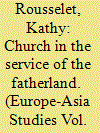

|
|
|
|
|
| Summary/Abstract |
The Russian Orthodox Church intensifies activities that it labels as patriotic activities and is an important participant in the patriotic education programmes organised by the state. Going beyond institutional types of discourse, this essay examines how believers experience patriotism in their daily lives, how religion nurtures the patriotic sentiment. Priests and the laity present themselves as being in the service of a country in combat. The Orthodox Church combines various moral values, which are at the heart of the patriotism of believers. Russian religious patriots have different relations with the state, and their patriotism sometimes diverges from the official calls. This essay draws on Church publications, interviews with priests and laity since 2008 and observation of religious events.
|
|
|
|
|
|
|
|
|
|
|
|
|
|
|
|
| 2 |
ID:
137480
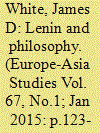

|
|
|
|
|
| Summary/Abstract |
The article follows the development of Lenin's philosophical conceptions and the historical context in which they emerged. It examines how Plekhanov's interpretation of Marxist philosophy was assimilated by Lenin. In the dispute between Plekhanov and Alexander Bogdanov Lenin took Plekhanov's side and in defence of Plekhanov wrote Materialism and Empiriocriticism. A major influence on Lenin was the correspondence between Marx and Engels published in 1913, which prompted him to study Hegel and other writers mentioned in the correspondence. Although Lenin's commentaries on Hegel and other philosophers were published as ‘Philosophical Notebooks’, the notes Lenin made on the Marx–Engels correspondence were not, owing to Stalin's peculiar requirements of the Lenin cult.
|
|
|
|
|
|
|
|
|
|
|
|
|
|
|
|
| 3 |
ID:
137477


|
|
|
|
|
| Summary/Abstract |
The Russian Federation's policy of promoting patriotism, in place since the early 2000s, raises the issue of how the country's non-Russian ethnic groups receive this policy. To answer this question, this essay studies the reception of Russian state-promoted patriotism in the 2000s among the Tatar community in Moscow. Looking at the activities of Tatar associations (especially the Regional Tatar National-Cultural Autonomy organisation), it shows the syntheses and compromises negotiated by activists between patriotism and ethno-cultural belonging in the capital. Paradoxically, their attempts at synthesis strengthen an essentialist representation of the Tatar community, leading ultimately, on the one hand, to criticism of state nationality policy, and on the other, to the discontent of Tatar independent activists who criticised the undemocratic rules and personal domination in the Regional Tatar National—Cultural Autonomy organisation supported by state authorities. These criticisms echo the tensions in the Russian political agenda at the beginning of the 2010s.
|
|
|
|
|
|
|
|
|
|
|
|
|
|
|
|
| 4 |
ID:
137473
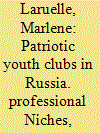

|
|
|
|
|
| Summary/Abstract |
Youth civic engagement in post-socialist countries and youth enrolment in defending the current regimes or contesting them became a growing topic of research in the 2000s. This essay examines a category of largely under-studied youth social engagement in Russia: patriotic clubs for children, teenagers and young adults. These clubs do not come close to the stereotypes promoted by the state patriotic education programmes. There is a major gap between the activists' patriotic narratives and practices, and those expected by the Kremlin. The first part of the paper investigates the notion of ‘patriotic club’ as a broad umbrella that covers multiple activities and practices. Then it explores their meanings and three of their main functions, as a professional tool on the job market, a source of cultural capital, and a way to develop a depoliticised social engagement.
|
|
|
|
|
|
|
|
|
|
|
|
|
|
|
|
| 5 |
ID:
137478
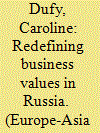

|
|
|
|
|
| Summary/Abstract |
In the aftermath of Russia's accession process to the World Trade Organization in 2011, an extensive public debate emerged on the modernisation of the economy. Enhanced state intervention and authoritarian modernisation were promoted as suitable options for Russia by opponents to neo-liberalism. Medvedev's liberal alternative was promptly discredited in the course of the political competition with Putin. Using ethnographic work, the present essay identifies three models of economic reform and investigates the way they have been considered by professionals in business and trade. The first model, the strategic model, contrary to conventional wisdom, is discussed in the discourse of business actors in terms of economic patriotism, public intervention and state strategic planning; second, the market model is viewed by others as a fully legitimate model; and a third model, the innovation model, combines narratives of efficiency and autonomy, which is attractive but fragile. Beyond their differences, these views have in common a concern to display the relationship of the business sector to the political sphere as a key variable for economic reform.
|
|
|
|
|
|
|
|
|
|
|
|
|
|
|
|
| 6 |
ID:
137479


|
|
|
|
|
| Summary/Abstract |
Stalin's purge of his military elite during 1937–1938 is one of the most unusual events of the Great Terror. Why would Stalin execute his most qualified officers at the same time as defence spending was rising and a world war was approaching? This article argues that a long history of the Red Army being perceived as vulnerable to subversion is central to understanding this military purge. When faced with perceived plots in the military Stalin tended to lean towards restraint, but by 1937 he felt he could no longer hesitate, and finally cracked down on what he saw as a compromised army.
|
|
|
|
|
|
|
|
|
|
|
|
|
|
|
|
| 7 |
ID:
137472
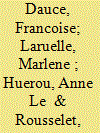

|
|
|
| 8 |
ID:
137474


|
|
|
|
|
| Summary/Abstract |
Relying primarily on field research in the Siberian city of Omsk, this essay analyses a variety of ways in which state patriotic terminology is used by individuals and groups through the study of organisations and activities that deploy the patriotic label, such as schools, museums, youth clubs, and summer camps. Analysis based on field work suggests that although patriotism includes a basic consensus about the homeland, a clue to the success of the concept is its capacity to be appropriated, distorted, or embedded in diverse understandings and practices. Easily ‘captured’ by different actors according to their needs and goals, patriotism also appears to be deeply rooted in the personal and the private. Everyday patriotism is thus far from being reduced to its top-down or official dimension. While patriotism is a tool that officials efficiently use to promote their political goals, it is also a symbolic resource that Russian society uses in its attempts to reformulate a new collective identity.
|
|
|
|
|
|
|
|
|
|
|
|
|
|
|
|
|
|
|
|
|